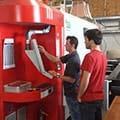Do What You Know
While many metal fabricators make a good salary, others turn to part-time occupations outside of their field to help pay the bills. With all the experience they’ve accumulated within their chosen profession, however, fabricators possess a unique set of skills that can be leveraged for various related side jobs to bring in extra income.
One great option is custom metal art and furniture. Many homeowners and businesses are willing to pay for unique, handcrafted metal pieces such as gates, wall art, tables, and sculptures. With the right tools and creativity, fabricators can turn scrap metal or raw materials into high-end custom products that can be sold online, through social media marketplaces, or at local craft fairs.
Another profitable side job is mobile welding services. Many people and businesses need welding repairs on equipment, fences, trailers, or even automotive parts but don’t have the means to bring items to a shop. By offering on-site welding, a fabricator can cater to clients needing quick, professional repairs. This type of work is especially in demand in farming, construction, and automotive industries.
Additionally, fabricators can make and sell small metal products like brackets, grills, and decorative hardware, which can be marketed through platforms like Etsy or eBay.
Ask the Fabricators
Recently in the Metal Fabrication Tips social media group, a member asked, “Outside metal fab, what does everyone do for cash?”
Along with numerous absurd—or even obscene—suggestions, many group members and visitors shared ideas from their own experience. The following are some of them:
- Fabricating things like doors, gates, and fences.
- Doing mechanic work, including engine building, car tuning, and motorcycle repair.
- “Mechanic work on the side, a lot of the time involving metal fab.”
- “Welding inspection and procedure development.”
- Mobile welding and trailer repair.
- Auto body and collision work.
- Building CNC plasma tables.
- “I sharpen knives.”
- Building decks.
- Woodworking.
- Construction.
- Gunsmithing.
- 3D printing.
- Machining.
- Plumbing.
- Metal art.
- HVAC.
- Trucking.
- Tire cutting.
- Scrap collection.
- Propane delivery.
- Window well covers.
- Build and repair boats.
- Do side jobs for friends.
- Small equipment repair.
- Hauling things for people.
- Vinyl graphics and banners.
- Chassis controls engineering.
- “More metal work but for fun.”
- “Fix stuff. Today snowblowers.”
- Fixing and flipping cars or houses.
- Building small buildings like shops.
- Several said they did powder coating.
- “Clean and repair vent hoods in restaurants.”
- “Hydraulic systems design and component sales.”
- Several said that they did plastic injection mold making.
- Cerakote finishing (a specialized, ceramic-based coating).
- “I’m a journeyman electrician; metal fab is my side work.”
- Landscaping, tree service, acreage mowing, and dirt work.
- “I like building ground blinds for hunters and ice shacks for fishermen.”
- “Just about anything that someone will pay me a reasonable amount to do.”
- “I build custom tube chassis and tube control arms. Hobby and profession.”
- One said, “I make precision space pencils,” and posted a picture of his work.
- Teaching (including a junior high shop class and welding at a technical school).
- “Seriously, fix and repair woodstoves, tractors, etc. Custom make and sell things.”
- “I move mobile homes and small buildings in the summer when it’s warm outside and weld inside a nice warm shop all winter.”
- “Maintenance at an asphalt plant. Basically, a little of everything from plumbing and electrical to welding to equipment operating and dump truck.”
- “I am a full-time instrumentation and controls guy, part time blacksmithing instructor, and volunteer/guest instructor at my local vocational high school.”
- A funny—or perhaps sad—answer was, “I sell my welding equipment for quick cash.”
Some of the answers were a little more unique, such as:
- Antiquities.
- Upholstery.
- Bartending.
- Podcasting.
- Hobby farming.
- Music producer.
- Cattle operation.
- Shipyard crane operator.
- Several were tattoo artists.
- Software/web development.
- Operator at a limestone quarry.
- Designing harvesting equipment.
- One interesting side job was aviation. One member posted a photo of an aircraft, likely implying that he was a pilot, while similar answers included “helicopter pilot” and “fly helicopters three months a year.” Another said, “I’m a corporate pilot. I do welding and have a lathe for a hobby.”
- “Software engineer. And DoorDash when I need extra cash. Don’t tell me I’m the only guy who’s got fabrication projects that aren’t in the budget.”
- “During tomato season I operate the evaporators and flash cooler for paste.”
- “I sell eggs as a side gig. It’s legit, $2 dozen. no lie. I won’t raise prices if not necessary.”
- “I always grow a big garden, and this year I took my excess and a folding table down to the corner and set up and sold pretty well all I brought with me each time I went.”
For some, metal fabrication was the side job while they worked full-time at another career. “Stocks” was one answer, “real estate” came up more than once, and one member said, “Full time insurance. Fab/metal for fun.” Another replied, “CTO, co-founder, owner of several businesses.”
One commented, “Personally, been doing software trading. Got the quant running on my computer in the background 24/7 so it’s really on autopilot. Cash flows $1-4k per month so nothing crazy but nice income.”
One respondent said, “I do food cost analysis and manage contract deals for restaurants across the county (sort of a purchasing agent). Metal work is a hobby and a lot more interesting than Excel all day. I didn’t start welding until I was in my 40s and I keep learning and adding equipment. So, I do a boring job to feed my addiction with metal fab and welding.”
As Mentioned, Do What You Know
Some fabricators wondered why someone might need a side job. One answered the question about side work with “more metalwork.” Another replied with, “More metal fab, do what you’re good at!” A third commented, “Make money with your hobbies and you’ll never need another job.”
One observed, “You’ll waste more time trying to make cash than just running a business properly, unless you’re selling something illegal.”
Another chimed in: “A properly structured business should do fine on its own if you work on it. I would never waste my time with anything else. Capitalize on what you are doing and do more.”
The consensus seemed to be that by expanding their businesses, or by tapping into metalworking side opportunities, metal fabricators can supplement their income while refining their craft.
One group member summed it up nicely: “I swear this industry is like a disease. I’ve owned and operated this steel supply and fabrication shop for over 17 years and worked here for 6 years before that. After we close the doors at the end of the day, I head back out to the shop and play. Most of what I make after hours, I give away, or donate for charity, benefits, etc., but sometimes I make a little cash. I just love what I do. Whenever I think I’ve had enough, I just think about how many people would love to have a ‘playground’ with all this equipment and inventory like this.”







